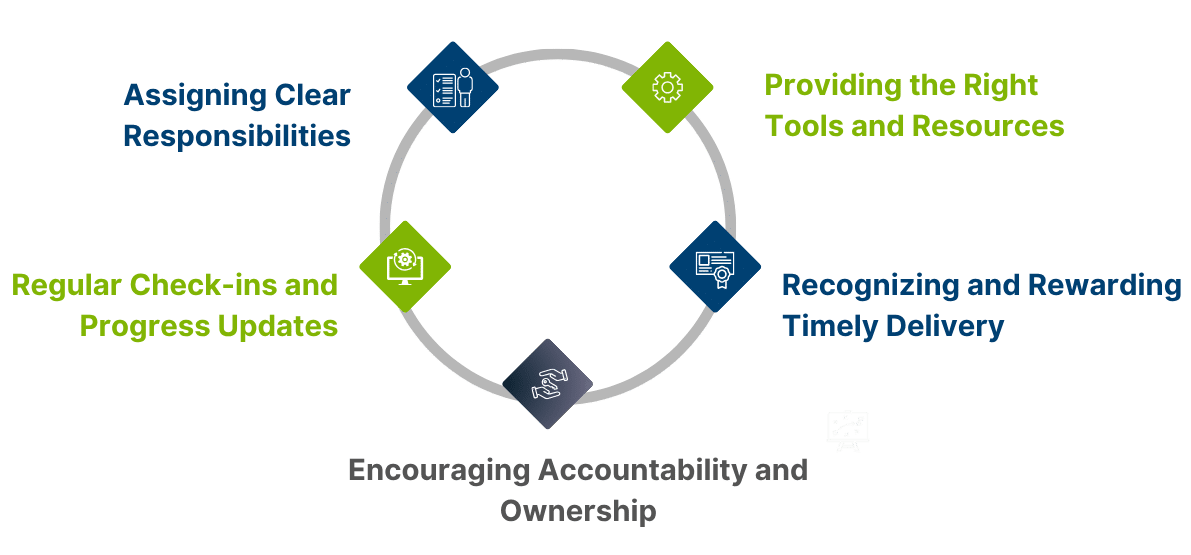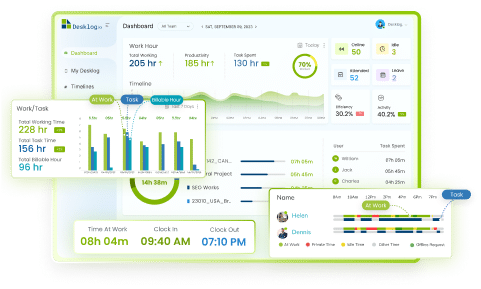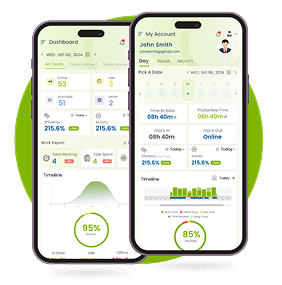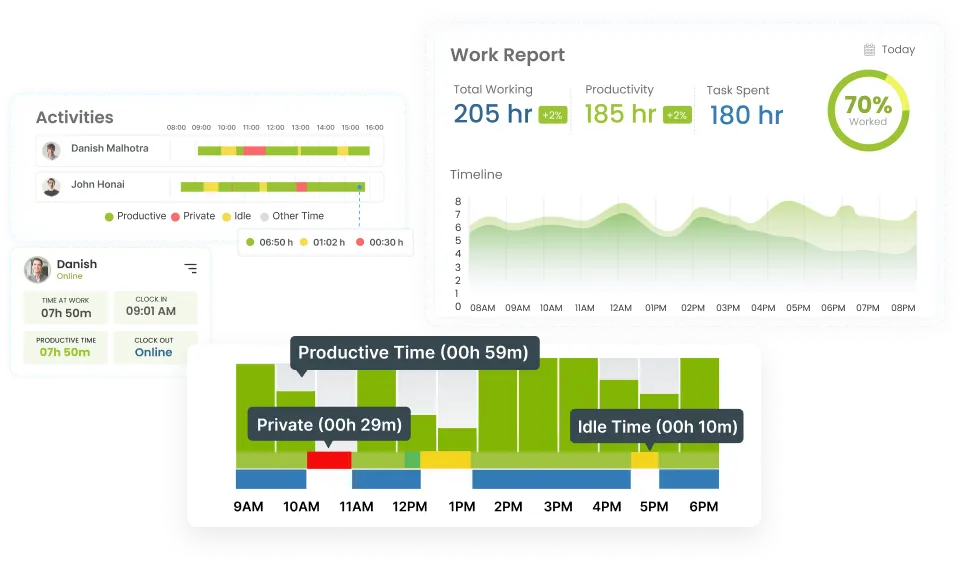According to research, nearly 80% of projects fail to meet their deadlines- a statistic that highlights one of the most common and costly challenges in modern work environments.
Whether due to poor planning, shifting priorities, lack of accountability, or unforeseen obstacles, missed deadlines can lead to lost revenue, reduced client trust, and decreased team morale.
In this blog, we’ll look into the key reasons deadlines are missed, what it really costs your team or business and how you can prevent it. Plus, we’ll show you how tools like time tracking software can help you track progress, improve time management and keep your projects on schedule.
This blog will cover the following sections:
- Reasons Why Deadlines Get Missed- Physical and Psychological
- Major Consequences of Missed Deadlines
- How Do You Ensure Your Team Members Do Not Miss Deadlines at Work?
- 5 Tips to Avoid Missing Deadlines in 2025
- Benefits of an Effective Response to Missed Deadlines
Why Do Deadlines Get Missed?
Deadlines are the most important part of projects and yet they are frequently missed. Understanding the root causes can help teams and individuals improve time management and execution.
Below are key factors contributing to missed deadlines, categorized into work environment issues and psychological/external influences.
Common Workplace Issues Why Deadlines Get Missed
Poor Planning and Estimation
Many projects start with unrealistic timelines. Poor project time estimation often results in underestimating the actual time required, leading to delays and missed deadlines.
Scope Creep
As projects evolve, stakeholders may introduce new requirements without adjusting deadlines. This uncontrolled expansion of scope delays progress and derails schedules.
Inadequate Communication
Misunderstandings between team members, departments, or clients can cause delays, especially when expectations are not clearly aligned or regularly updated.
Resource Constraints
Limited access to the right people, tools, or technology can prevent teams from meeting milestones. Overloaded staff or multitasking across projects is a frequent bottleneck.
Unforeseen Technical Issues
Bugs, compatibility problems, or infrastructure failures often take longer to fix than expected. This is especially true in fast-changing or complex technical environments.
Lack of Accountability
When roles and responsibilities are unclear or there’s no follow-up on progress, deadlines can be overlooked without consequence, leading to project slippage.
Common Psychological and External Factors Why Deadlines Get Missed
Procrastination and Cognitive Bias
Humans are naturally prone to delay complex tasks. The planning fallacy which involves underestimating how long tasks will take, plays a major role in missed deadlines.
Burnout and Fatigue
Employee burnout sets in when exhaustion takes over, making it difficult for employees to stay motivated and focused—often resulting in missed deadlines.
Fear of Failure or Perfectionism
Some individuals delay delivery due to anxiety about the quality of their work. They may over-polish or hesitate to submit something they feel isn’t perfect.
External Crises or Market Shifts
Sudden organizational changes, economic instability, or global events (like a pandemic) can disrupt priorities, divert resources and make original deadlines unachievable.
Lack of Autonomy or Motivation
When people feel disconnected from the purpose of their work or micromanaged, their engagement drops. Low motivation leads to slower progress and missed targets.
Three Major Consequences of Missed Deadlines
Missed deadlines don’t just create short-term inconveniences- they can have lasting negative effects on productivity, relationships and business success. Below are the three major consequences of missed deadlines.
Reduced Productivity and Team Morale
When deadlines are repeatedly missed, it creates a ripple effect throughout the team. The sense of urgency and direction that deadlines provide begins to fade, leading to confusion about task priorities and a lack of accountability.
Team members may feel demoralized, especially if they perceive that their hard work isn’t resulting in tangible progress or recognition.
Over time, this can lead to burnout, resentment, and disengagement, all key drivers of high turnover and declining performance.
Loss of Client and Stakeholder Trust
Clients, investors, and internal stakeholders expect reliability and professionalism. Consistently missing deadlines sends the opposite message: that the team is disorganized, inefficient, or not prioritizing the project appropriately.
Clients may seek more dependable partners, stakeholders may tighten oversight or funding, and leadership may lose confidence in project teams.
The impact can go beyond one project, affecting future business opportunities, renewals, and the organization’s overall reputation in the market.
Financial and Operational Setbacks
Time is money, and missed deadlines often lead to significant financial consequences. Delays can trigger budget overruns due to extended labor costs, rushed last-minute work, or penalties from clients.
In many cases, trying to “catch up” leads to compromised quality, shortcuts, or poor decision-making under pressure. This not only affects the current project but can also increase the risk of future rework, legal issues, or compliance failures.
The net result is a cycle of lost time, lost money and increased organizational stress.
How Do You Ensure Your Team Members Do Not Miss Deadlines at Work?

Assigning Clear Responsibilities
One of the most effective ways to prevent missed deadlines is by making sure that every team member knows exactly what they are responsible for. Assign specific tasks with clear deliverables, due dates, and expectations.
With Desklog’s automated project tracking, managers can easily assign tasks and subtasks, set priorities, and monitor project-specific time allocation.
The inclusion of step-by-step task planning and project estimates ensures that responsibilities are clearly outlined and tracked in real-time, giving teams the structure they need to stay focused.
Regular Check-ins and Progress Updates
Frequent communication is essential for staying on track. Regular check-ins allow you to track progress, identify blockers early, and adjust plans as needed.
Desklog’s real-time progress tracking provides up-to-date visibility into each team member’s status, allowing managers to use data-driven insights during check-ins.
The automated timesheet and time-tracking features also supply accurate logs of hours spent, helping to evaluate whether timelines are being met and enabling more informed follow-up discussions.
Encouraging Accountability and Ownership
Accountability is about encouraging individuals to take ownership of their work by involving them in planning and decision-making processes.
With Desklog’s activity tracking, including keyboard/mouse activity, app usage, and optional screenshots, team members remain aware that their performance is visible, which promotes a healthy sense of responsibility.
Providing the Right Tools and Resources
Even the most skilled team can falter without the right tools. Make sure your team has access to a good time and project tracking software.
Desklog equips teams with an integrated suite of tools including automated time tracking, project and task tracking, and collaborative dashboards.
Recognizing and Rewarding Timely Delivery
Acknowledge team members who consistently meet deadlines, not just in performance reviews but also through public recognition, shout-outs in meetings, or incentives.
Desklog makes this easier with detailed productivity insights, allowing managers to identify top performers based on real data.
5 Tips to Avoid Missing Deadlines in 2025
Here are five practical tips to help individuals and teams stay on track and how Desklog time tracking software can support each one.
Break Large Tasks into Smaller Steps
Taking on big projects can feel overwhelming, often leading to procrastination or delays. Breaking large tasks into smaller, manageable subtasks helps build momentum and provides a clearer path to completion.
Desklog makes this easy with its subtask management feature. You can organize projects into smaller components and track the time spent on each part. This structured approach improves visibility and reduces the risk of missing critical milestones.
Adopt Time Blocking and Focus Sessions
Time blocking or time boxing lets you allocate specific hours of your day to focused work, helping prevent multitasking and distractions. Combined with focus sessions, this technique improves deep work and keeps you on schedule.
By using Desklog’s real-time progress tracking you can monitor how well time blocks are being used and adjust accordingly. The system records actual working hours and breaks, making it easier to stick to structured time blocks and stay productive.
Maintain Transparent Communication Channels
Clear and open communication helps teams stay aligned on goals, deadlines, and expectations. Miscommunication is a common cause of missed deadlines, especially in remote or hybrid settings.
With Desklog, team leaders can track project timelines and share updates through its centralized dashboard. Visibility into each team member’s progress, supported by accurate time and activity data, creates accountability and fosters a transparent work culture.
Regularly Review and Adjust Plans
Even the best plans need revisiting. Deadlines can be missed when teams stick to outdated schedules that no longer reflect current realities. Regular reviews help you adapt and make informed adjustments.
Desklog supports this with customizable reports and real-time analytics. These insights allow you to evaluate time spent versus project progress and make data-driven decisions to optimize workloads, reassign tasks, or set more realistic timelines.
Benefits of an Effective Response to Missed Deadlines
Restoring Trust Quickly
When a deadline is missed, timely and transparent communication helps rebuild confidence with clients, stakeholders and team members.
An effective response demonstrates accountability and professionalism, showing that the team is committed to resolving issues rather than ignoring them.
Learning and Adapting for Future Success
Addressing missed deadlines effectively provides valuable insights into what went wrong, be it resource constraints, unrealistic timelines, or process inefficiencies.
By analyzing these factors, teams can implement improvements, adjust planning methods, and set more achievable goals.
Minimizing Negative Impact on Projects
Quick and thoughtful responses help contain the fallout from a missed deadline. By reassessing priorities, reallocating resources, or adjusting project scopes, teams can reduce delays and prevent cascading effects on dependent tasks.
This focused mitigation minimizes disruptions, keeps projects aligned with overall objectives, and helps ensure delivery remains on track despite challenges.
Improving Team Resilience and Morale
How a team handles setbacks like missed deadlines greatly influences its overall morale and cohesion. An effective response that emphasizes problem-solving and collective accountability encourages a supportive atmosphere where challenges are viewed as opportunities rather than failures.
This strengthens trust within the team, builds resilience, and motivates members to stay engaged and committed.
Conclusion
Missing deadlines might be common, but it’s not inevitable. With clear planning, open communication, and the right tools in place, your team can stay focused, accountable, and ahead of schedule.
With Desklog, you don’t just track time, you gain a complete overview of team performance, productivity trends and project progress. Features like automated time tracking, real-time analytics etc. help eliminate guesswork and bring much-needed transparency to your workflow.
It enables you to identify bottlenecks early, allocate resources more effectively and make timely decisions, all while making sure that nothing (and no one) falls behind schedule.
FAQ
1Why do projects miss deadlines so often?
Projects often miss deadlines due to poor planning, unrealistic expectations, lack of communication, shifting priorities, resource constraints, or unforeseen obstacles like technical issues or market changes.
2What are the biggest consequences of missing deadlines?
Missed deadlines can lead to financial losses, reduced client trust, damaged reputation, decreased team morale, and even project failure if not properly managed.
3How can I prevent my team from missing deadlines?
You can prevent missed deadlines by setting realistic timelines, assigning clear responsibilities, maintaining regular check-ins, using time-tracking tools like Desklog, and fostering a culture of accountability.
4What should I do if I know I’m going to miss a deadline?
Communicate early and honestly with stakeholders, provide an updated timeline, explain the reason for the delay, and present a plan to get back on track. Proactive transparency helps preserve trust.
5How does procrastination contribute to missed deadlines?
Procrastination leads to last-minute work, rushed results, and stress. It’s often driven by perfectionism, lack of motivation, or being overwhelmed by complex tasks.
6Can project management tools help avoid missed deadlines?
Absolutely. Tools like Desklog offer features such as automated time tracking, real-time progress updates, task assignments, and activity monitoring to keep projects and people on schedule.
7How do I motivate my team to meet deadlines consistently?
Recognize and reward timely delivery, involve the team in planning, set clear goals, reduce micromanagement, and use tools that provide visibility and performance insights—like Desklog.
8What’s the role of communication in meeting deadlines?
Clear, regular communication ensures that everyone is aligned on expectations, aware of timelines, and able to flag issues early. It’s critical for preventing confusion and last-minute surprises.
9How do I handle recurring deadline issues with an employee?
Address the issue directly but constructively. Use performance data from Desklog to understand their time usage, identify roadblocks, and work with them on improving time management and focus.
10How can Desklog help reduce missed deadlines?
Desklog provides automated time tracking, task and subtask management, real-time analytics, and detailed productivity reports. These features help teams plan better, monitor progress accurately, and catch issues before they escalate.

















